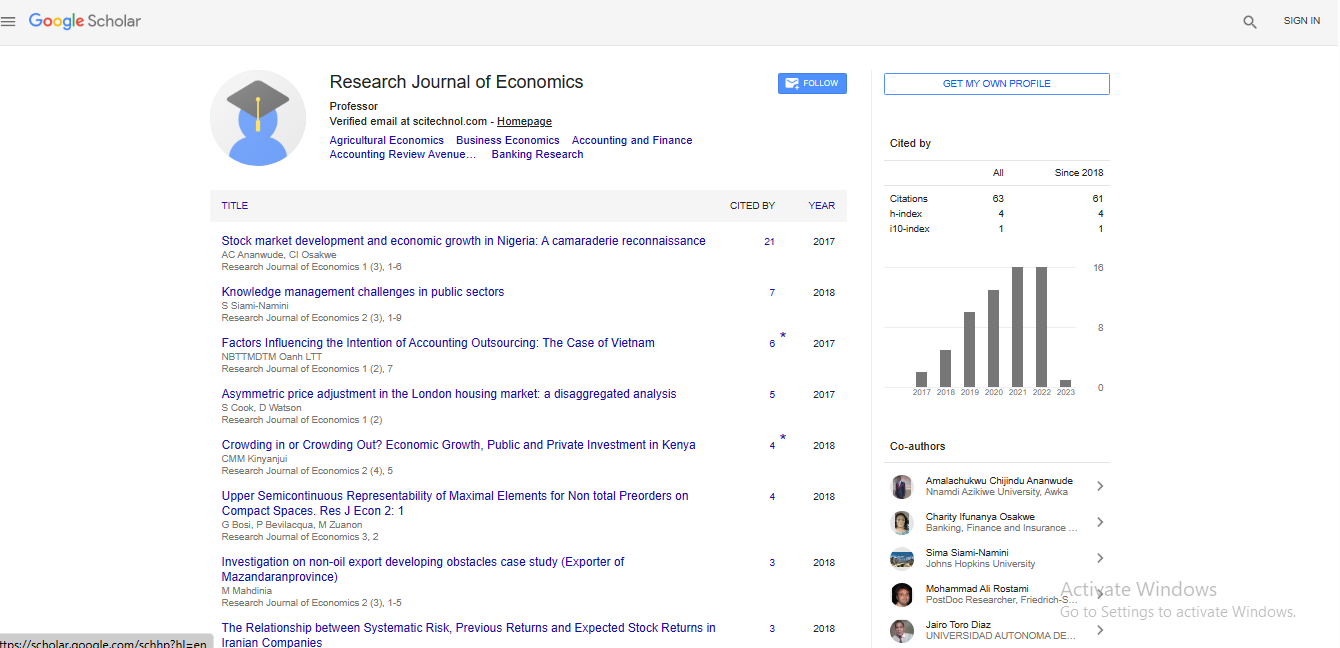Editorial, Res J Econ Vol: 4 Issue: 3
Impact of COVID-19 on Economy in India: Some Reflections for Policy and Program
Joseph K*Independent Researcher, Swaroop Nagar, Kanpur, Uttar Pradesh, India
*Corresponding Author : Joseph K
Independent Researcher, Swaroop Nagar, Kanpur, Uttar Pradesh, India
Email: joseph_k@gmail.com
Received Date: October 29, 2020; Accepted Date: November 8, 2020; Published Date: November 20, 2020
Citation: Joseph K (2020) Impact of COVID-19 on Economy in India: Some Reflections for Policy and Program. Res J Econ 2020, 4:2.
Keywords: Covid, Depression
Editorial
Handling Covid adequately requires preventive and proactive measures at each level. It is important that people carefully notice preparatory conduct: utilizing covers, keeping up social separating, and hand washing. Nearby specialists and state governments need to zero in on aggregate endeavours, for example, improved waste assortment and the executives, dodging pointless development, guaranteeing satisfactory clinical offices, accessibility of specialists and other medical care staff, and medications. Contamination control is another basic region, particularly in north India where the cold weather months are set apart by elevated levels of contamination. Studies have shown that delayed introduction to helpless air quality expands weakness to Covid. Contrasts in assessment regardless, the unfavourable wellbeing effect of delayed presentation to filthy air make individuals powerless to respiratory lot contaminations. Instead of enjoy accuse games, state governments must zero in on controlling contamination in their purviews.
The Center, as well, has a job. It must keep on giving help to states when required, give oversight and spotlight on issues, for example, antibody advancement and rollout. Controlling the pandemic is the obligation of each and everybody, independently and altogether. The episode of COVID-19 carried social and monetary life to a halt. In this investigation the attention is on evaluating the effect on influenced areas, for example, flying, the travel industry, retail, capital business sectors, MSMEs, and oil. Global and inner versatility is confined, and the incomes produced by movement and the travel industry, which contributes 9.2% of the GDP, will negatively affect the GDP development rate. Flying incomes will descend by USD 1.56 billion. Oil has plunged to 18-year low of $ 22 for each barrel in March, and Foreign Portfolio Investors (FPIs) have removed colossal sums from India, about USD 571.4 million. While lower oil costs will shrivel the current record shortfall, invert capital streams will extend it. Rupee is persistently devaluing. MSMEs will go through an extreme money crunch. The emergency saw a stunning mass migration of such coasting populace of transients by walking, in the midst of countrywide lockdown. Their concerns basically were loss of work, every day apportion, and nonattendance of a government backed retirement net. India must re-examine on her improvement worldview and make it more comprehensive.
Coronavirus has likewise given some one of akind occasions to India. There is an occasion to take an interest in worldwide flexibly chains, multinationals are losing trust in China. To 'Make in India', a few changes are required, work changes being one of them. The flare-up of COVID-19 has affected countries in a colossal manner, particularly the cross country lockdowns which have carried social and monetary life to a stop. A world which perpetually hummed with exercises has fallen quiet and all the assets have been redirected to meeting the never-experienced emergency. There is a multi-sectorial effect of the infection as the financial exercises of countries have eased back down. What is astounding and important is an alert which was rung in 2019 by the World Health Organization (WHO) about the world's failure to battle a worldwide pandemic. A 2019 joint report from the WHO and the World Bank assessed the effect of such a pandemic at 2.2% to 4.8% of worldwide GDP. That expectation appears to have worked out, as we see the world getting inundated by this emergency.
In another report entitled'COVID-19 and the universe of work: Impact and strategy reactions' by International Labor Organization, it was clarified that the emergency has just changed into a monetary and work market stun, affecting flexibly (creation of products and enterprises) yet in addition interest (utilization and speculation). Worldwide Monetary Fund's (IMF) boss said that, 'World is confronted with exceptional vulnerability about the profundity and span of this emergency, and it was the most exceedingly terrible financial aftermath since the Great Depression'. The IMF assessed the outside financing requirements for developing business sectors and creating economies in trillions of dollars. India also is moaning under the burden of the pandemic and according to news reports in Economic Times distributed on 23 March 2020, the financial analysts are fixing the expense of the COVID-19 lockdown at US$120 billion or 4% of the GDP (The Economist, 2020). This COVID-19 pandemic influenced the assembling and the administrations area—neighbourliness, visits and ventures, medical care, retail, banks, inns, land, training, wellbeing, IT, diversion, media and others. The monetary pressure has begun and will develop quickly. While lockdown and social separating bring about profitability misfortune from one perspective, they cause a sharp decrease popular for merchandise and ventures by the customers in the market on the other, in this manner prompting a breakdown in financial movement. Nonetheless, lockdown and social separating are the main practical devices accessible to forestall the spread of COVID-19. Governments are learning by doing, as it was on account of accomplishment of control methodology in Bhilwara locale, Rajasthan, India, the monetary dangers of shutting the economy stay in any case. Likewise, complimenting the caseload bend is basic for economy everywhere, except it accompanies a monetary expense.
 Spanish
Spanish  Chinese
Chinese  Russian
Russian  German
German  French
French  Japanese
Japanese  Portuguese
Portuguese  Hindi
Hindi 